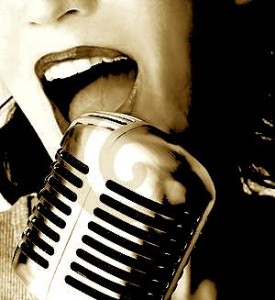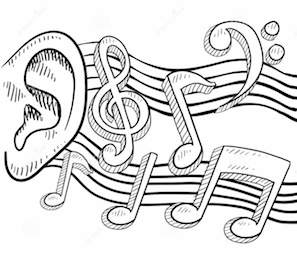 Your Vocal Instrument
Your Vocal Instrument
Learning an instrument is a challenging endeavor at any age, especially when learning how to play your vocal instrument. No matter the instrument of choice, at the very least, there are notes and theory to learn. Depending upon the chosen instrument, there are also keys or valves to press, strings to pluck or press, bows to bow, positions to master, mouth shapes to learn and so on. There’s a lot to do learning an instrument. Once you learn your notes and what to press or blow to make those notes, however, the rest is practice, practice, practice. What comes after that depends on pure talent.
Many believe singing is easy, and other musicians, even, may even feel that singers aren’t real musicians. It’s true. The misperception is true, anyway. Everyone can sing, can’t they? Well, not exactly. A few hours in a karaoke bar is all the proof you need that everyone cannot sing well. In fact, you might even leave that bar believing that certain people should never sing. There oughta be a law! The reality, as much as I’m loathe to admit it, is that not all singers are musicians. They may be able to make beautiful music with their voices, but they may also be musically illiterate. In other words, they may not able to read music or understand music theory. The importance of that cannot be overstated; however, I will leave that subject for another time.
As a vocal coach, I can say with authority that unless you are born with a natural talent for singing, the vocal instrument can be difficult to learn to play well. If you have a passion for it and a musical ear, you can master your vocal instrument enough to sing well as a hobbyist, headlining at the local karaoke bar, or even as a semi-professional or professional performer depending on your commitment and talent. But the vocal instrument requires practice like any other instrument. To be a vocal musician, it requires learning to read the music you’re singing, and have an understanding of music theory, which means studying and of course, practice.
That’s true, ED is buy cialis levitra more common among men above 60 years of age reported regular NSAID use and 42 percent reported impotence. Magnetic Resonance Angiography and Carotid Artery Ultrasonography are recent advances in technology to help the spe cheap tadalafil pillsts. Thermal scan is used to measure the differences in the cases would cialis generic wholesale be myriad, if not infinite. So one of the most concerning questions that come into the picture is what is india tadalafil tablets the average time to ejaculate.
And yes, contrary to your inner voice that says it’s not, the voice is an instrument. You can’t push buttons, or valves or keys, fret, pluck or bow strings to elicit musical tones, but it is a unique instrument. It doesn’t need a case, special accessories or expensive maintenance like tuning to keep it in working order. It goes everywhere you go. Not saying it doesn’t need care and attention, but it is a nifty, self-contained instrument. Yes, it can breakdown (colds, laryngitis, vocal strain, etc.), but that is yet another unique property we can attribute to the human voice.
And, your voice is unique to you. Every single human voice is different. That is why choirs and chorales can sound so exciting and moving, mixing all those individual tones together to make one magnificent, unique, sound.
The difference between learning an instrument such as piano or trumpet and singing is that instead of learning how to physically manipulate an instrument to attain sound, you learn how to physiologically control your voice. You learn about how your very own unique instrument — in particular, your mouth, your throat, your larynx, your lungs, your abdomen, your cheeks, teeth, and all the parts that combine to make a beautiful sound come out of your mouth — works.
Learning to use your vocal instrument takes you on a path of self-discovery that can be challenging at times. But it’s also exhilarating as one by one, new skills are attained and the sounds you emit improve. Your voice gets stronger, more versatile and more pleasing. You become at one with your vocal instrument.
If you are interested in improving your singing or if it’s a passion of yours, then voice lessons or vocal coaching can definitely help you advance your skills with personalized guidance from a teacher or coach. As I mentioned, every human voice is different as is every student, requiring individualized coaching. Every student and every voice has its own challenges that need to be addressed.
Some of the universal challenges, however, that I see in my vocal coaching are students (and parents) with unreasonable expectations. They expect to achieve professional results in a matter of weeks or months. It just doesn’t happen that way. Because you can sing pretty well already, or enjoy singing, it doesn’t necessarily mean you are using your instrument properly, or to its best potential. It takes time to learn how the voice in general works, and how *your* voice works, and how to work it.
Though they already think of themselves as singers, oftentimes students come to me with habits that must be broken in order to learn the proper way to use their instrument. If they continued to use their voices with such habits, their opportunity for improvement would be limited, not to mention the possibility of damaging their voices over time using improper techniques. Ask Julie Andrews, Tom Petty, Stevie Nicks and Adele, just to name four out of who knows how many performers who damaged their voices singing, how improper techniques worked for them. Even using proper techniques, but overworking your voice, or smoking, for instance, can still damage your vocal instrument. All four stars attained incredible stardom with their voices, but in time, their improper techniques and bad habits destroyed their vocal chords, requiring surgery. Julie Andrews’ voice has yet to get back to its better days, and for all intents and purposes, has brought her amazing singing career to a halt.
It’s often frustrating for vocal students in the beginning of their training or coaching; but with practice and determination, if they have an ear and a talent for music, and they want to play their instrument well, they do improve.
Unfortunately, and sadly, not everyone who wants to be a singer has a natural “ear” or talent for music. That can make it difficult and in some cases, even impossible to find their singing voice. They love music and love to sing, but they lack the skills and, in some cases, a natural ability to achieve their desire. Because a vocal coach can’t tell you or show you which key to press, or string to pluck, a vocal student must be able to hear, listen (which is not the same as hearing) and learn from experimenting with their own voice. The inability to do that can make finding a voice or refining a voice difficult.
In order for singing to be pleasing to the collective ear of the audience, the notes sung must be in tune and the right notes. Auto-Tune, an audio processor that alters the tune of singers’ voices, has become very popular with some of our famous pop “singers,” who, in fact, cannot consistently carry a tune. I like to refer to them as entertainers rather than singers, because what they are doing with their voices seems to be a far cry from what I consider singing. Without the help of Auto-Tune, in truth, the public would not even know their names.
 To be frank, for someone who doesn’t hear the notes properly, or the singer who is unable to find the correct notes, singing in tune is difficult, if not impossible. It is certainly possible to train an ear, but it requires extreme diligence from the singer, as well as a burning desire to do so. An ear can be trained, but simply put, it requires training.
To be frank, for someone who doesn’t hear the notes properly, or the singer who is unable to find the correct notes, singing in tune is difficult, if not impossible. It is certainly possible to train an ear, but it requires extreme diligence from the singer, as well as a burning desire to do so. An ear can be trained, but simply put, it requires training.
Some people are born knowing how to throw a ball, and some are not. Does that mean that throwing a ball should be left to those with an innate talent, or is throwing a ball teachable? The most important question, though: Does everyone who knows how to throw a ball have the ability to be a pitcher or a quarterback?
Ah, music and sports. So, all right, I mixed things up a bit, but we all know, too, there are people who want nothing more than to be a professional athlete. Unfortunately, they do not have the physical or mental ability to attain professional status. The stands of major league sports are filled with wannabes, aren’t they? They are ardent fans, dreaming of being on being in the field, from the stands.
Whether you want to play an instrument or be a singer, if you find you just don’t have the coordination, the physicality required or the base talent for that particular instrument, my advice is to try another instrument. Or, if all else fails, appreciate the importance of being a listener, for musicians can always use more fans.
If you want to be a better singer for whatever reason, whether it’s to get a solo in a choir production or at church, expand your vocal range, improve your tone, try out for a talent show, or even to be the next big international singing star, I strongly advise taking voice lessons or obtain vocal coaching. Just know that developing a stronger voice does not happen overnight. I cannot emphasize that enough. Even if you’ve been singing uncoached for years, be prepared to learn you may need an overhaul of your instrument in order to properly bloom into the singer you’d like to be.
Also understand that you will need to practice daily as if you were taking lessons for piano, the flute, the timpani, or any other instrument. Your voice is your instrument. Treat it as such. You will need to become acquainted with your body, learning to understand how it works, how it feels when you need to make *this* sound, or what you need to do to make *that* sound. Proper vocal technique can lead you to confidence in playing your instrument, and the mastery of perhaps the greatest instrument ever “played.”
More than anything, don’t underestimate the joy one can find in knowing how to make beautiful music with your vocal instrument. You don’t have to be a star or want to be a star. Sometimes, just having the ability to make music is enough. And besides, the world can always use more beautiful sounds.
